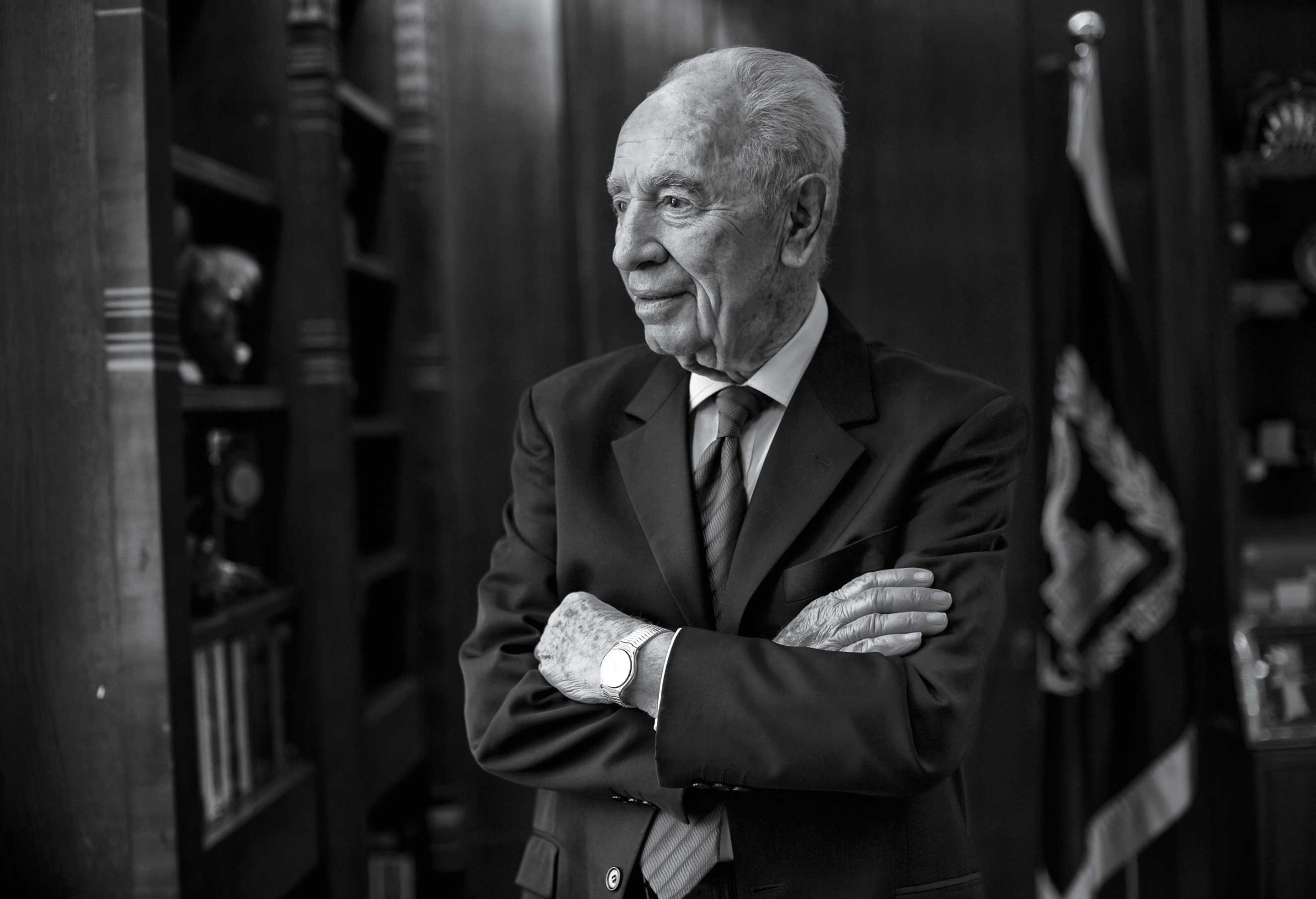
The lifetime of Shimon Peres, who died on Sept. 28 at age 93, spanned the lifetime of the state of Israel. Born in what is now Belarus, his family moved to Tel Aviv more than a decade before Israel was founded in 1948. He lived on a kibbutz when those communal settlements and a utopian, leftist ideology defined the nascent state. He was also an architect of the Israel Defense Forces, the institution that ultimately defined Israeli society. A hawk in the precarious early decades of the country’s existence, Peres at first encouraged the establishment of Jewish enclaves on the West Bank, famously calling settlements “the roots and the eyes of Israel.” Yet in 1994, he shared a Nobel Peace Prize with Palestinian leader Yasser Arafat and Israeli Prime Minister Yitzhak Rabin for negotiating the Oslo Accords, which aimed to finally resolve the contest for the land between the Jordan River and the Mediterranean Sea.
Rabin was assassinated by an Israeli extremist not long after, and Arafat died in 2004. Peres lived to see Israel continue to change, turning increasingly inward and pessimistic after the promise of Oslo crumbled amid the Palestinian suicide bombings and Israeli incursions that were the Second Intifada, which peaked in 2002. But Peres remained what he had become: Israel’s most prominent dove. The country that in its earliest decades had fought for its life at regular intervals–at least seven wars since 1948–is now the most powerful nation in the Middle East. Its military pre-eminence is guaranteed by the U.S., including military aid that will run to $38 billion over the next 10 years. Peres argued over the past decade that Israel could afford to rise from a defensive crouch and take another chance on peace. Polls showed him to be in the minority, but to a world that persisted in viewing the conflict through the prism of talks, his continued prominence amounted to an article of faith, despite whatever grim new reality had taken hold on the ground.
You no longer have to travel to Israel to understand how much has changed since 1994. New York City is far enough. Israel’s ambassador to the U.N. is Danny Danon, an impish provocateur and the author of a book arguing that Israel should simply annex most of the occupied West Bank. The country’s new consul general in New York has a similar name–Dani Dayan–and credential: he formerly headed the organization representing the 400,000 settlers on the West Bank.
Both men were appointed by Prime Minister Benjamin Netanyahu, who no longer has to pretend to hold any faith in the Oslo process he campaigned against. The phrase Middle East conflict now refers to Syria and ISIS, not Israel and Palestine. In U.S. politics, Israel is mentioned as a test of a reflexes: How fast can a candidate, especially a Republican, express unqualified support?
It’s possible that Peres’ passing will help outsiders move past the frame of Oslo (already long dead to Jewish Israelis and Palestinians) to whatever comes next–though it’s not at all clear what that might be. Israelis’ extraordinary ingenuity in other fields–agronomy, technology–somehow has never been applied to its political situation, a point Peres not only argued but showcased late in his own extraordinary life.
“You always have to find some new ways. Old ways are too known,” he told TIME in February. In his 10th decade, he was as good as his word, displaying a questing spirit and a ravenous appetite for knowledge, especially about the human mind. Never well-loved as a politician, he was embraced in Israel’s largely ceremonial role of President: the idealism he espoused suited the position–and Israelis’ vision of themselves.
The morning in 2011 when I visited him in his office, he talked about cucumber harvests, Mao Zedong and, finally, Netanyahu’s dismissive remarks on the latest round of peace talks. “Leaders must go ahead even when moving ahead is controversial,” Peres said. “You must be ahead of time, because if you want to represent the status quo, what do you need leaders for?”
It’s a question that Israelis and Palestinians have been asking for more than 20 years. No answer yet.
More Must-Reads from TIME
- Why Trump’s Message Worked on Latino Men
- What Trump’s Win Could Mean for Housing
- The 100 Must-Read Books of 2024
- Sleep Doctors Share the 1 Tip That’s Changed Their Lives
- Column: Let’s Bring Back Romance
- What It’s Like to Have Long COVID As a Kid
- FX’s Say Nothing Is the Must-Watch Political Thriller of 2024
- Merle Bombardieri Is Helping People Make the Baby Decision
Contact us at letters@time.com